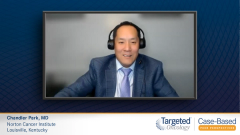
Clinical Insights: Ongoing Trials in the Renal Cell Carcinoma Landscape
Thoughtful discussion of ongoing clinical trials in the renal cell carcinoma landscape, with a particular focus on their eventual clinical implications.
Chandler Park, MD: I think one of the things that makes adjuvant treatment so confusing is some of the studies that you mentioned, that were not positive. And so, at the ESMO meeting this past year, you mentioned the IMmotion 10 that was presented. Before I talk about the IMmotion010, we do have to talk about the differences between PD and PD-L. Pembrolizumab is considered a PD inhibitor. Nivolumab, which we use in metastatic renal cell clear cell, with ipilimumab, and also, nivolumab by itself is also considered a PD inhibitor. On the other hand, in this study that you mentioned, called the IMmotion010, the study medication here is a PD-L inhibitor, specifically known as atezolizumab. There has been some differences, at least, in renal cell with PD inhibitors and PD-L inhibitors, and so, we have to keep that in mind. Now, going to the IMmotion010. The IMmotion010 was a randomized phase 3 study of patients randomized to atezolizumab versus placebo as adjuvant therapy in patients with renal cell cancer at increased risks of recurrence after resection. Patients are randomized with atezolizumab at 1200 mg IV every three weeks versus placebo for a total of one year. The primary endpoint was disease-free survival. Secondary endpoint was overall survival, and also, they looked at the disease-free survival in the population, and also, the PD-L. Now, in terms of the results, the results were negative. There was no increase. There was no decrease of disease-free survival based upon this study. This calls a lot of controversy among the GU oncologists, and we still need to follow up in this theory of the PD-L versus PD, but the study was very similar to the pembrolizumab study, but the atezolizumab study was negative. Now, in terms of the second study that you mentioned, which is the CheckMate 914. This was also presented at ESMO 2022, and this is an interesting study because just to give a quick background, in the metastatic space, clear cell renal cell, we know based on the CheckMate 214 that nivolumab and ipilimumab has very good signal in terms of overall survival, and also, response rate. So the question is, can you move nivolumab and ipilimumab to an earlier line for these high risk patients, and so, that's what they did in this study. CheckMate 914 is a phase 3 randomized double-blind multi-centered study evaluating nivolumab, plus ipilimumab versus placebo. There is actually a part B to this study, which is going to be very fascinating when it's released. But the part B of this study was nivolumab modeled therapy versus placebo, and that has not been released. That's something that I'm keeping an eye on. Now, in terms of the randomization, patients were randomized based upon clear cell histology, high risk stage 2As, 2Bs, T3s, T4s. Patients were randomized in a one-to-one fashion with nivolumab at 200 mg every two weeks for a total of 12 doses, plus ipilimumab 1 mg per kilogram every six weeks for a total of four doses, or equivalent, or placebo for 24 weeks. Now, this study was presented at ESMO '22 by Dr. Meltzer, and unfortunately, this study was also negative. The study did not meet the primary endpoint of disease-free survival. And so, if you talked to some of the renal cell GU experts; how is this different from the adjuvant pembrolizumab study? One is, in the adjuvant pembrolizumab study, you receive one year of checkpoint inhibitor with pembrolizumab. In this study, it was 24 weeks, and so, you didn't get that whole one year coverage. And you also - Patients received the ipilimumab, and so it was a dual checkpoint inhibitor study. So some people wonder does PD-L - I mean, does the PD with the nivolumab with the ipilimumab with the CTLA-4; does the CTLA-4 really add any benefit? Also, the question of 24 versus 52 weeks of adjuvant treatment immunotherapy. Therefore, it's going to be very important to know which is the part B of the study, which is adjuvant nivolumab only for 24 weeks. So, I'm very excited about this study with the part B, but it was also a negative study. Now, the last study that you mentioned, which is the PROSPER study. Now, the PROSPER study also was a negative study at ESMO 2022. And so, the PROSPER study is a little bit different in terms of the study design. And the reason it's different is, in this study, you didn't just include clear cell renal cell cancer patients; other variant histology was included, 80-to-84% of the patients were clear cell, but you also had 16-to-20% that were non-clear cell. And so, some of the studies that we know up till now is - some of the variant histology of renal cell, such as chromophobe, such as papillary may not be that immunogenic. That's the one caveat to this study. With that backdrop, the PROSPER study is a phase 3 randomized study comparing perioperative nivolumab versus observation in patients with renal cell cancer undergoing nephrectomy. Patients were stratified based on stage T2, or any M, no positive that were planned for nephrectomy. Patients in the investigational arm received nivolumab 400 mg IV every four weeks, with one dose prior to surgery followed by nine doses of nivolumab. The control arm was surgery, followed by surveillance. In terms of the conclusions, perioperative nivolumab did not improve disease-free survival in patients with high risk for recurrence. And so, this was also a negative study.
Transcript Edited for Clarity

















